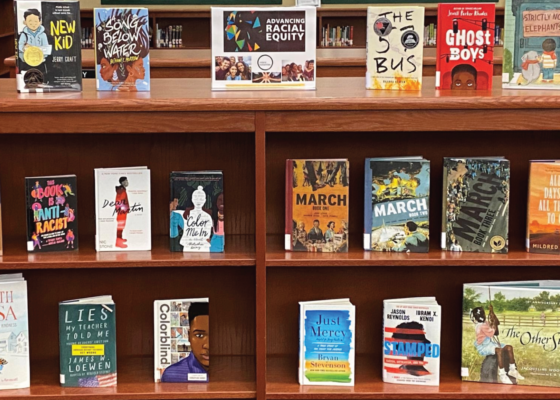Cut the NEH? Small savings, big losses
March 13, 2017A couple of years ago, Aspire Johnson County launched a series of conversations to bring together hundreds of residents and dozens of businesses to talk about how they can make…
A couple of years ago, Aspire Johnson County launched a series of conversations to bring together hundreds of residents and dozens of businesses to talk about how they can make their county a better place to live, work and play.
Last year, 38 small pop-up exhibits on the Bill of Rights were given—for free—to Indiana schools, libraries and other nonprofits in celebration of its 225th anniversary this year.
And last month, a group of teenagers clustered around a visitor to Franklin Central High School, jockeying for position with smartphones and snapping selfies. Their guest? Indiana poet Adrian Matejka.
What links these and similar events happening this week, next month and the next few years in Indiana? They were all made possible by Indiana Humanities … and they probably won’t happen if Congress cuts funding to the National Endowment for the Humanities from the federal budget.
We understand the desire for a budget that balances, and we know tough choices have to be made. We also know that this proposed cut to the NEH (and other important cultural organizations) would do more harm than good.
First, let’s look at the “good”: Cutting the NEH will save $148 million. By some calculations, this represents .0001 percent of federal spending—roughly equivalent to what the government spends on copy paper and paper clips.
Now the harm: The elimination of the NEH would slash or eliminate programs that serve Indiana communities from Vevay to Valparaiso.
You see, the bulk of the funds received by the NEH is distributed to state-level agencies—including Indiana Humanities—to support programs at the local level. And this is where the story gets really good: On average, for every $1 statewide agencies receive, they leverage $5. Since Indiana Humanities receives slightly more than $800,000 from the NEH each year, that results in an estimated $4 million annual impact for the kind of community-changing programs we described above—and an unquantifiable amount of energy seen when we work with local chambers of commerce and visitors bureaus, small museums and libraries, and businesses that employ top talent.
And why is this so important? Well, these days, we talk a lot about the power of “place” in the growth of thriving economies. We acknowledge that healthy communities require more than houses, commercial districts and infrastructure. And we hold passionately to the democratic principles that define our nation. But, even as we do these things, we neglect some important truths.
As we talk about “place making,” we fail to recognize factors that define our sense of place.
As we chase “quality of life,” we overlook its most tangible components.
As we celebrate democracy, we forget the elements that make it possible.
Think about that last point. How could we have democracy without the words that inspire it? How could we build a democracy without understanding the history of nations? How can we shape democracy without respecting the many cultures, faiths, values, fears and experiences that constitute what we call a nation? And how can we sustain democracy without civil discourse?
In other words, how can we have democracy, sense of place or quality of life without the humanities—history, literature, poetry, philosophy and ethics, world languages and cultures, religious studies, archaeology and related disciplines?
The humanities connect us to each other and help us examine our place in the world. They aren’t partisan. They aren’t a luxury. They are essential elements of the infrastructure of what we call community. The humanities are for everyone—and Indiana Humanities ensures that rural, suburban and urban Hoosiers have access to them.
Yes, cutting the NEH would slightly reduce the federal budget. But that savings pales in comparison to what we would lose as a community, state, nation and people.
Indiana Humanities Board Members:
The Honorable Jerry Torr (Chair), Carmel
State Representative House District 39
Ms. Elizabeth Bechdol (Chair Elect), Auburn
Director of Agribusiness Strategies, Ice Miller
President and CEO, AgriNovus Indiana
Ms. Keira Amstutz, Indianapolis
President and CEO, Indiana Humanities
Ms. Myra Borshoff, Martinsville
Owner, MB Communications LLC
Ms. Carol Ann Bowman, Valparaiso
Corporate Secretary & General Counsel, Whiteco Industries
Ms. Rosemary Dorsa, Indianapolis
Vice President, Indiana Philanthropy Alliance and Director, GIFT Technical Assistance Program
Dr. Edward (Ted) Frantz, Indianapolis
Director for the Institute of Civic Leadership and Mayoral Archives, University of Indianapolis
The Honorable Maria Granger, New Albany
Judge, Floyd County Superior Court #3
The Honorable Christina Hale, Indianapolis
Former State Representative House District 87
Ms. Malina Jeffers, Indianapolis
Director of Engagement and Operations, Midtown Indianapolis
Mr. James M. Macdonald III, Indianapolis
Executive Director & Market Manager, J.P. Morgan Private Bank
Mr. Doran Moreland, Indianapolis
Executive Director, Statewide Diversity and Community Outreach, Ivy Tech Community College
Dr. Beverley J. Pitts, Greenwood
President Emeritus, University of Indianapolis
Mr. Timothy P. Robinson, JD, Indianapolis
Mr. Larry Rowland, Fort Wayne
Retired chairman, Lincoln National Reinsurance Companies
Rabbi Sandy Eisenberg Sasso, Indianapolis
Director of The Religion, the Arts and Spirituality Initiative of Butler University in partnership with Christian Theological Seminary
Mr. Adam D. Thies, Bloomington
Dr. Joseph F. Trimmer, Muncie
Emeritus Professor of English & Director Emeritus, Virginia B. Ball Center for Creative Inquiry, Ball State University
Ms. Susanne Wasson, Indianapolis
Marketing Director, U.S. Crop Protection, Dow AgroSciences LLC
The Honorable Jonathan Weinzapfel, Evansville
Chancellor, Ivy Tech Community College Southwest/Wabash Valley regions; Former Mayor of Evansville


